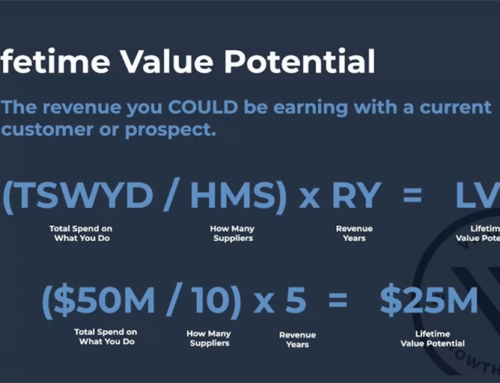Many business owners are sitting on a potential gold mine — with “potential” as the operative word. If your B2B organization is like most seasoned enterprises, it has collected a treasure trove of customer and prospect data, with more tidbits flooding in a constant basis.
Unfortunately, much of this data may be hidden away in various corners of your electronic storehouses, from random spreadsheet entries on the proverbial S: drive to pieces of data scattered across your employees’ Outlook contact folders. This information could playing a huge role in your company’s success, if only it were being managed and organized properly.
That’s where a customer relationship management (CRM) software platform and sales operations leadership can come to the rescue by finding, culling, and unifying that data into something you can actually use. Let’s look at some major benefits your B2B organization can obtain from a CRM.
Integration of Your Sales and Business Data
Your customers come to you, and you go to them, through all kinds of channels. Data comes in via email queries, completed surveys, web-based requests for more information, and numerous follow-up touches by your personnel. Existing customers may maintain ongoing data sharing through product/service re-orders, cancellations, and collaborative projects.
A CRM software platform can take all those instances, from all those points of contact, and bring them under one dashboard. This ensures that your B2B sales team never misses a glimmer of interest, a scheduled follow-up touch, or a new opportunity revealed through the preponderance of data now at their fingertips.
A Single Point of Truth for Your Marketing Efforts
Making sense of your B2B marketing efforts can make you feel like you’re fighting a multi-headed dragon. That’s because your organization may receive all manner of incoming leads via multiple sources, from online ads and your website to social media channels, trade show appearances, and word-of-mouth marketing in professional networking groups. But how do you interpret all these different sources of leads — especially when each source’s leads may carry different weight or occupy different places in the sales funnel?
CRM software can receive all this data, disentangle it, de-duplicate it to flush out redundancies, and give you that coveted “single point of truth” that every sales and marketing team dreams of having. With a defined sales operations role, a CRM can enable you to see exactly where each prospect and customer stands along the path toward the next sale, which means you can make sure the ideal marketing tactics are ready and waiting for them — no matter which marketing channels originally brought them your way.
Increased Accuracy and Accountability
Numbers tell stories in the B2B sales world. But if you can’t see all those numbers (and what they add up to) at a glance, you can’t see where you are in the story or where that story is going. Without accurate data, your most brilliant sales experts can only hazard wild guesses instead of making solid forecasts. A CRM software platform that brings your entire sales pipeline, anticipated revenues and sales forecasts into crystal clarity gives you a great deal more power over your business’s destiny.
Sales team accountability is another make-or-break issue for B2B organizations. How can you really know what each and every member of the sales team accomplished — or failed to accomplish — day after day and week after week? Recording those action and transactions into your CRM platform gives you an instant understanding of how your employees are using their time, which tasks are lagging behind, and which resources might be better allocated.
Greater Employee Productivity and Efficiency
Time is money — and few activities can take up more of your B2B team’s valuable time than parsing innumerable bits and pieces of valuable but scattered data. All this manual effort takes the place of the actual work you could be accomplishing if only that data were already integrated and made readily available.
That’s exactly what CRM software is all about. By using this type of software platform to automate what would otherwise prove an enormously tedious and time-consuming process, you can create and maintain a productivity-ready environment from the moment your doors open in the morning to when they close (if they close) at night. Your employees will have instant access to the customer data, time sheets, schedules, databases, reminders, contact histories, and other information they need, whenever they need it, all within one integrated system. That frees them up to do what they do best — namely, their jobs.
As you can see, a CRM software platform can make all the difference between simple collecting or having data and actually being able to make full use of that data. From integrating your sales, business and marketing efforts to boosting your team’s productivity, you’ll wonder how your B2B organization ever got along without a CRM solution that really works.






